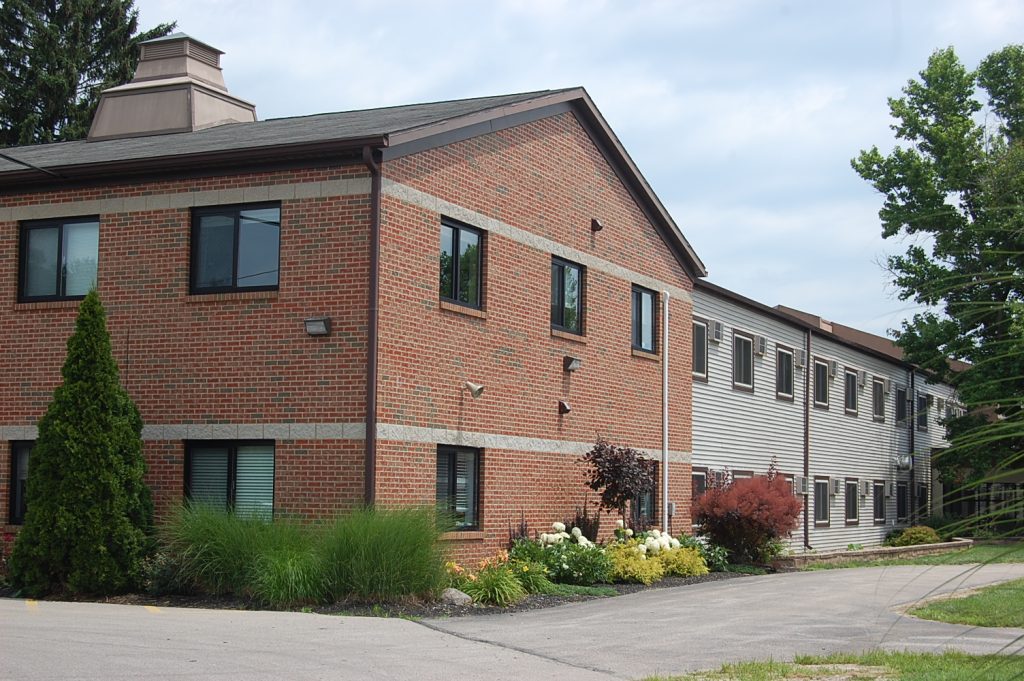The Ridge Ohio
The Ridge Ohio is a premier residential treatment center located just outside Cincinnati, providing evidence-based addiction recovery in a private, retreat-like setting. The program combines clinical excellence with comfort and confidentiality, catering to professionals and individuals seeking comprehensive care. The Ridge’s philosophy emphasizes family involvement, personalized treatment, and long-term sobriety planning. Each client receives individualized…
Cedar Oaks Wellness Center
Located just outside the Cincinnati metro area on a serene 120-acre wooded campus, Cedar Oaks Wellness Center offers a comprehensive addiction and mental health treatment experience rooted in individualized care and holistic wellness. The program stands out for its integration of medically supervised detox, residential programming, and mental health day treatment in a peaceful campus…
Glenbeigh
Located in a tranquil setting in Rock Creek, Ohio, Glenbeigh offers a full spectrum of addiction treatment services—from medically supervised detox to residential, outpatient, and continuing care—designed to support adult clients in achieving lasting recovery. As a member of the ARMC Healthcare System and affiliate of the Cleveland Clinic, the program blends clinical rigor with…
Why Trust ExecutiveRehabs
Since 2003, our expert team has built comprehensive resources on executive rehab centers that you can trust to find the right treatment for you.
Transparency and accuracy matter, and we believe you deserve nothing short of the best possible experience when reaching out for support.
FAQs on Executive Rehab
An Overview of the Executive Treatment Landscape in Ohio
Ohio is home to a diverse professional class spanning healthcare, manufacturing, logistics, higher education, finance, and rapidly expanding technology sectors.
Executives in these industries often manage large teams, oversee complex operations, and carry high-stakes responsibilities that require constant decision-making under pressure.
These demands can increase vulnerability to burnout, chronic stress, anxiety, and substance use: issues that frequently go unaddressed due to concerns about privacy, reputation, and professional continuity.
Public behavioral-health data indicate a significant need for specialized support across the state.
Annual population-level surveys show that more than a million Ohio residents meet criteria for a substance use disorder each year, yet only a portion enter specialty treatment.
Leaders and high-performing professionals are part of this treatment gap. Many delay help due to fear of organizational impact, visibility in their communities, or stigma within their industries.
Executive-appropriate programs in Ohio exist but remain limited relative to the broader treatment landscape, which makes understanding available options essential.
What Defines an Effective Ohio Executive Rehab Setting?
An effective Ohio executive rehab, or anywhere for that matter, is not defined by luxury alone.
Rather, it encompasses a set of clinical, logistical, and privacy-related features designed to meet the needs of individuals whose professional responsibilities and public profiles demand enhanced discretion and flexible treatment structures.
Programs suitable for executives in Ohio generally offer:
-
Enhanced confidentiality:
Private or semi-private rooms, discreet admissions processes, limited census, and secure record-keeping practices that minimize exposure within local networks. -
Controlled work access:
Structured, limited technology use that allows essential responsibilities to be managed without compromising therapeutic progress. This often includes secure Wi-Fi, designated call windows, and private workspaces. -
Comprehensive mental health care:
Assessment and treatment of co-occurring conditions such as anxiety, depression, trauma, sleep disorders, and chronic stress—conditions commonly tied to leadership roles. -
High-quality clinical programming:
Evidence-based therapies, medication-assisted treatment where appropriate, and multidisciplinary teams capable of addressing complex behavioral-health needs. -
Amenities that support rest and privacy:
Comfortable accommodations, wellness offerings, and environments designed to promote recovery without the distractions or lack of privacy that may exist in high-volume facilities.
Not all programs advertise themselves as “executive” rehabs; the more important question is whether the clinical environment can adapt to the demands and privacy expectations of high-level professionals.
Executive-Specific Challenges in Ohio
Executives in Ohio face several barriers when seeking substance use or mental health treatment.
Understanding these challenges can help identify programs that offer the right balance of flexibility, clinical rigor, and discretion.
1. Limited number of dedicated executive tracks
Ohio has a robust behavioral-health system, but only a small percentage of programs are structured specifically for executives or professionals.
Many facilities offer high-quality care but may not provide the enhanced privacy, controlled device access, or specialized mental-health support required by high-responsibility roles.
2. Confidentiality concerns in smaller markets
Executives operating in close-knit business communities, common in Ohio’s midsize metropolitan areas and regional hubs, are often cautious about being recognized by peers, patients, staff, or local stakeholders.
Programs with strong confidentiality practices or more secluded campuses can help mitigate these concerns.
3. Complex insurance and employer-benefit arrangements
High-earning professionals may be enrolled in employer-funded plans, leadership benefit structures, or customized insurance models.
Navigating coverage for residential or intensive outpatient treatment can be complicated. Executive-oriented programs typically help with benefit verification, workplace documentation, and communication planning.
4. Difficulty stepping away from professional obligations
Executives often struggle to unplug fully due to fiduciary duties, board responsibilities, or the fear of organizational disruption.
Programs that incorporate structured, minimal work contact, balanced with clinical boundaries, can help reduce the anxiety that comes with temporary disengagement.
5. Co-occurring stress and mental health needs
Burnout, chronic stress, anxiety, and depression are common among professionals in leadership roles.
Programs lacking psychiatric integration or trauma-informed care may not meet the needs of executives whose substance use is intertwined with long-term psychological strain.
Staying in Ohio vs. Traveling Out of State for Rehab Programs
Executives evaluating treatment options often compare in-state care with destination programs in regions such as Florida, Colorado, or California.
Each path has advantages, and the best choice depends on the individual’s needs, work context, and privacy concerns.
Reasons to Consider Staying in Ohio for Executive Rehab
-
Proximity to family and existing healthcare providers
-
Stronger alignment with state-specific workplace, licensing, or monitoring requirements
-
Reduced logistical complexity for leave arrangements and follow-up care
-
Familiarity with local systems and easier transitions to outpatient services
For some leaders, remaining in Ohio supports a more stable recovery process, especially when family engagement is important or when occupational licensing boards prefer in-state treatment pathways.
Reasons Executives Sometimes Travel Out of State
-
Desire for full geographic separation from work and social circles
-
Preference for highly private or low-volume environments is not widely available in Ohio
-
Availability of luxury campuses with more resort-like amenities
-
Greater anonymity in areas where they are less likely to be recognized
Both approaches can be effective when aligned with clinical needs and personal circumstances.
The top consideration should be selecting a program that provides strong evidence-based care, confidentiality, and support for long-term professional reintegration.
Data, Policy, and Regulatory Considerations for Executive Programs in Ohio
Ohio’s behavioral-health system is supported by statewide initiatives aimed at expanding evidence-based treatment and improving outcomes.
State agencies, public universities, and research institutions contribute to the development of best practices, workforce training, and clinical guidance.
Executives seeking treatment in Ohio benefit from understanding several foundational elements:
-
Licensing and accreditation:
Facilities must meet standards set by state behavioral-health authorities. Accreditation from national bodies is an additional quality indicator. -
Evidence-based treatment guidelines:
Many Ohio programs rely on evidence-informed care frameworks disseminated by state-supported academic centers and federal agencies. -
Protected health information laws:
Programs must comply with HIPAA and, for substance use treatment, additional federal confidentiality rules governing patient records.
Executives should feel empowered to ask detailed questions about privacy, clinical practices, psychiatric integration, and discharge planning.
Practical Next Steps for Executives
A thoughtful treatment decision begins with clarity about personal needs and professional realities.
Executives considering treatment in Ohio can benefit from the following steps:
-
Identify goals: privacy level, distance from home, mental-health needs, and acceptable degree of work access during treatment.
-
Evaluate programs based on clinical strength, professional experience, and their ability to adapt to leadership-level responsibilities.
-
Request information on confidentiality protocols, communication policies, and return-to-work planning.
-
Review how each program coordinates aftercare, coaching, psychiatric support, and relapse-prevention tailored to high-stress roles.
-
Include trusted advisors—family, physicians, or mental-health professionals—in decision-making when appropriate.
A Discreet Path Forward for Support
Executives and professionals navigating addiction or mental-health challenges deserve treatment that respects their privacy, honors their responsibilities, and provides top-tier clinical care.
For personalized guidance and discreet support in choosing an appropriate program, ExecutiveRehabs.com offers one-on-one assistance tailored to the needs of leaders, entrepreneurs, and high-performing professionals.
References and Resources
SAMHSA – 2022–2023 NSDUH: Ohio State Tables (Direct PDF)
https://www.samhsa.gov/data/sites/default/files/reports/rpt56188/2023-nsduh-sae-state-tables/2023-nsduh-sae-state-tabs-ohio.pdf
SAMHSA – 2022–2023 National Survey on Drug Use and Health (State Estimates Overview)
https://www.samhsa.gov/data/report/2022-2023-nsduh-state-estimates
RecoveryOhio – 2021 Annual Review (Ohio Governor’s Office; Direct PDF)
https://recoveryohio.gov/static/2021-RecoveryOhio-Annual-Review-Final.pdf
OhioMHAS – Mental Health & Addiction Services (Licensing, Standards, State Programs)
https://mha.ohio.gov/wps/portal/gov/mha/about-us/licensing
Case Western Reserve University – Substance Use Disorders Center of Excellence
https://case.edu/socialwork/centerforebp/areas-of-focus/substance-use-disorders-center-excellence
The Ohio State University Wexner Medical Center – Addiction Medicine Resources
https://wexnermedical.osu.edu/mental-behavioral/addiction-medicine
University of Cincinnati Health – Addiction Science Program
https://www.uchealth.com/services/addiction-science-program/
HHS – HIPAA Privacy Rule (Official Summary)
https://www.hhs.gov/hipaa/for-professionals/privacy/index.html
SAMHSA – 42 CFR Part 2: Confidentiality of SUD Patient Records
https://www.samhsa.gov/about-us/who-we-are/laws/confidentiality-regulations-faqs



